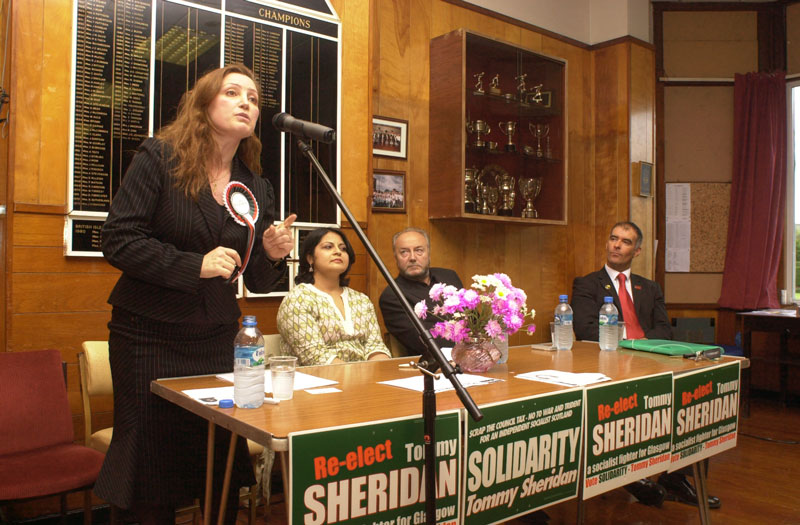But Health Secretary Alex Neil is facing some serious questions after using his office to intervene with his local health board over hospital services in his constituency.
When he was challenged about it at Holyrood 11 days ago, his answer was far from complete.
The Ministerial Code may be relevant here for other reasons too.
Here's a longer version of the story in today's Sunday Herald.
When he was challenged about it at Holyrood 11 days ago, his answer was far from complete.
The Ministerial Code may be relevant here for other reasons too.
Here's a longer version of the story in today's Sunday Herald.
EXCLUSIVE
Tom Gordon
Scottish Political Editor
HEALTH Secretary Alex Neil has
become the latest minister to be accused of misleading parliament after
intervening in a row over services at a hospital in his Airdrie & Shotts
constituency.
He told MSPs earlier this month
that a final decision on proposals to move in-patient mental health services
from Monklands Hospital to Wishaw General had been delegated to his deputy
Michael Matheson to avoid a conflict of interest.
But NHS Lanarkshire has now
revealed that Neil contacted them through his officials just days after
becoming health secretary in September, and expressed his reservations about
the proposal.
Neil had already objected to the
plan, as the local MSP, before becoming health secretary.
According to NHS Lanarkshire,
Neil asked to review the proposals before they were submitted to its board
members for a final decision.
NHS Lanarkshire has now agreed
to review them in light of his feedback.
Labour said Neil’s words in
parliament couldn’t be squared with NHS Lanarkshire’s account.
They also accused him of trying
to rewrite the proposals before they went to his deputy for a final decision in
a fait accompli.
 |
| Neil campaigning in 2011 |
Labour, defending the seat, claimed the SNP government might close the A&E unit.
As the SNP candidate, Neil insisted it wouldn't and won the seat.
After the election, the provision of in-patient mental health services at Monklands came to the fore.
NHS Lanarkshire has been consulting of whether to centralise the services at Wishaw General.
In August 2011, Neil told his local paper he wanted continuity at both Monklands and Wishaw.
“I strongly believe it to be essential that both retain an in-patient mental health unit.”
Barely three weeks later, Neil got the chance to have a far greater say in the matter when he replaced Nicola Sturgeon as health secretary in a reshuffle.
After hearing that Neil had indeed used his new position to intervene, Central Scotland Labour MSP Siobhan McMahon contacted NHS Lanarkshire.
On September 17, twelve days after Neil's move from the infrastructure portfolio to health, the board's head of communications emailed McMahon's office with a confirmation.
"In response to your question
regarding the status of the Modernising Mental Health proposals I can advise
you that the new Cabinet Secretary has asked for some time to review the
proposals prior to it going to our Board. We expect to hear back from the
Cabinet Secretary soon."
"Prior to the proposals being taken to the NHS Lanarkshire Board for consideration, they were submitted to the Scottish Government Health Department as part of the consultation process.
"The Cabinet Secretary for Health and Wellbeing has expressed some reservations regarding the provision of acute inpatient mental health services at Monklands Hospital.
"In light of the Cabinet Secretary's feedback, NHS Lanarkshire is reviewing the proposals. NHS Lanarkshire will keep stakeholders informed as this work progresses."
 |
| Neil outside Monkands Hospital |
Siobhan McMahon (Central Scotland) (Lab): While we await the appointment of a new chair, the cabinet secretary has recently intervened in provision of mental health services by NHS Lanarkshire. Does he intend to intervene on reviews of acute services in all areas prior to those reviews being considered by the relevant health boards and, of course, before crucial appointments are made?
Alex Neil: There is an issue about the future of mental health services at Monklands hospital. Because it lies in my constituency, that matter is being dealt with by my ministerial colleague, Michael Matheson.
However it now appears that Matheson's decision will only be the final link in a chain which Neil has helped forge.
Matheson will decide whether to approve the plan which finally emerges from the board in the New Year, but in the meantime Neil seems to be shaping that same plan to his liking, which would reduce Matheson's role to that of a rubberstamp.
Labour also believe Neil may have fallen foul of the Ministerial Code, which says ministers must avoid any conflict of interest when dealing with an issue which directly affects their constituency.
Constituency Interests
7.5 Where Ministers have to take decisions within their area of portfolio responsibility which might have an impact on their own constituency or region, they must take particular care to avoid any possible conflict of interest. They should advise the Permanent Secretary and, in the case of junior Scottish Ministers, the relevant Cabinet Secretary of the interest, and responsibilities should be arranged to avoid any conflict of interest.
7.5 Where Ministers have to take decisions within their area of portfolio responsibility which might have an impact on their own constituency or region, they must take particular care to avoid any possible conflict of interest. They should advise the Permanent Secretary and, in the case of junior Scottish Ministers, the relevant Cabinet Secretary of the interest, and responsibilities should be arranged to avoid any conflict of interest.
McMahon said: “It appears that Mr Neil has joined the growing number of SNP Ministers who have misled parliament.
"More importantly, it looks as if he has abused his position as Cabinet Secretary by meddling in NHS operational matters within his own constituency, and derailing a modernisation process which was a crucial part of renovating Monklands Hospital.”
NHS Lanarkshire last night said Neil had not been in touch personally, but said government officials had conveyed Neil’s views to the board.
A spokesman said: “NHS Lanarkshire has been developing plans to continue the modernisation of mental health services in Lanarkshire.
“Prior to the proposals being taken to the NHS Lanarkshire board for consideration they were submitted to the Scottish Government Health Department as part of the consultation process.
“The new Cabinet Secretary for Health and Wellbeing has expressed some reservations regarding the provision of acute inpatient mental health services at Monklands Hospital.
“We are currently reviewing the proposals before submission to the Board early in the new year.“Throughout this process there has been no direct contact between the Health Secretary and NHS Lanarkshire. All communications have come from Scottish Government officials.”
A Scottish Government spokesman said: “NHS Lanarkshire have yet to put forward their revised proposals for reform of mental health services to the Scottish Government.
"When a decision is required, the proposals will be put to Minister for Public Health Michael Matheson due to the issue concerning matters in Mr Neil’s constituency.”









